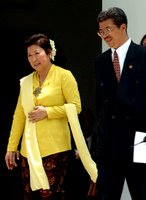 Being a Chinese-Indonesian is not the same as being a Chinese-Singaporean, or for that matter, being from mainland China or Taiwan.
Being a Chinese-Indonesian is not the same as being a Chinese-Singaporean, or for that matter, being from mainland China or Taiwan.Recently an Australian guy, married with a “native” Javanese woman and almost 27 years living in Indonesia, wrote an article about his Chinese-Indonesian friend which was married also a “native” woman.
…..I have a Chinese-Indonesian friend who is Muslim. He married a “native” woman. During the riots of in May 1998, I told him he was lucky that he could go anywhere safely, because he had successfully assimilated with the Indonesian majority.
His answer surprised me: “Nobody will ask about my religion or my wife,” he said. “People will look at my face and because I look like a Chinese, my religion and my wife will not save me from harm.”
My wife was discriminated against in terms of her salary. She earned less than her Chinese-Indonesian friend, just because they worked at a company owned by a Chinese-Indonesian businessman. My wife with more than five years’ experience at the company got only half the salary of her Chinese-Indonesian friend, who had worked for just a month at the same managerial level.
Once I read an article about indicators of social tolerance. According to the article, there are three degrees of social tolerance. The worst is when somebody does not tolerate the existence of anyone from outside his group. Such a person will try to banish “different” people if it’s not possible to make them the same as him- or herself.
In the case of religion, for example, somebody from a certain religion might say someone from another belief system will go to hell. Another, less extreme example is when somebody does not tolerate other people’s religious activities. A better level of social tolerance is when someone accepts the existence of “different” people. He or she may work together and cooperate with them, but cannot accept the “different” person becoming a family member, for example, through marriage.
The most tolerant people are those who not only accept “different” people, but can welcome them as family members. This group of people is the smallest. There are only a few people who can do that, and my experience shows that people like this are marginalized both by their own groups and their spouse’s groups. If you belong to this group, believe me, your life is more complicated than the lives of the other two groups.
We are born with differences. That is true. But some differences are significant for certain people, and some are not. We have to accept that. It is no use to claim equality among all those inherited differences, even by way of the law.
My experience proves that if you are not strong enough, you should keep your group identity as strong as possible. Assimilation and regulations cannot remove social discrimination from every corner of the world.
I have never regretted my decision to marry a Javanese woman, and I will not claim equal rights to citizenship. I am happy with that as long as everybody can accept my existence. If you are Chinese-Indonesian you will be better off going to a school where there are a lot of Chinese-Indonesians and working for a company owned by a Chinese-Indonesian. It will help you avoid a lot of discrimination.
The writer is a Chinese-Indonesian who married a pribumi (native) woman. Wijanto Hadipuro

3 comments:
Best regards from NY!
Mcse video training Best mcse 2003 bangalore Cooking schools in london max test price printed license plate frames Woman body fat chart mcse testing centers mcse course Microsoft office suite training Free spyware anti virus protection earn money while working at home http://www.credit-reports-9.info
I have been looking for sites like this for a long time. Thank you! » »
This is very interesting site... » »
Post a Comment